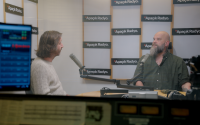11 June 2006Steven Laffoley
Last week, after considering the Haditha Massacre, I wondered in print about the value of blame. "What," I asked, "could be gained by blaming soldiers or insurgents or even the president of the United States for this crime in Iraq?" And I wondered, "How can we possibly blame others and demand punishment when we, as Americans, are not without sin?" As I then incautiously noted, "we" elected this president, and "we" supported this war and these troops.
For my simple use of the pronoun "we," I learned much about the divisive politics of blame in America.
Almost immediately after publishing my thoughts, there came to my computer mailbox an electronic river-rush of angry email. "We didn't elect this president," more than one writer objected. "The presidency was stolen - twice."
Wrote another, angrily, "I don't support those killers, and I never supported this war."
And another writer thought that by my use of the word "we" I meant that I had personally voted twice for George W. Bush, and that I had long supported the troops and the war. (In truth, as an unapologetic, liberal pacifist, I did neither - a position, I note as an active writer, then as now, earned me much abuse in the early days after September 11, 2001.)
Interestingly, most writers took exception my use of the pronoun "we," howling that they had opposed this war, that they had opposed this president, and that they were, certainly, without sin - and that they damn well felt justified "casting stones" at those they blamed.
Now, to be clear, as a careful observer and recorder of the American experience, I know that the elections of 2000 and 2004 were tampered with. And I know that many hundreds of thousands of Americans marched and spoke out against this war. And I know that many thousands more Americans spoke of impeaching the president and imprisoning his high officials for their crimes.
It's just that, well, I am not so sure about the value of blame.
Consider: placing blame is different than seeking justice. Placing blame creates the conditions for dark divisiveness: when we think of blame, we think of "us" versus "them." And when we think of "us" versus "them," we think of "victims" and "victimizers." And when we think of "victims" and "victimizers," we naturally desire revenge against the "other" rather than seeking justice for all.
The difference between assigning blame and seeking justice is keenly felt in the use of the pronoun "we."
I was not being foolishly inexact when, writing about this war and Haditha, I said that we all, as Americans, were not without sin. I was referencing the larger idea of "we." As in "We the people of the United States of America." As in the original social contract of Americans.
Consider the full preamble to the United States Constitution: "We the people of the United States, in order to form a more perfect union, establish justice, insure domestic tranquility, provide for the common defense, promote the general welfare, and secure the blessings of liberty to ourselves and our posterity, do ordain and establish this Constitution for the United States of America."
When we consider this war, we must consider this truth: Conservative Republicans are not killing Iraqis. Americans are killing Iraqis. And "we" are all Americans, conservatives and liberals - the 59 or so million that voted for George W. Bush, and the 59 or so million that did not.
If we recklessly engage in assigning blame, then we will fuel the need for vengeance. And if we fuel the need for vengeance, we will raise the need for violence. And if we raise the need for violence, we will create endless divisions.
And frankly, "We the people of the United States" are already too divided.
Rather than assigning blame to others, let us seek justice for all. Let us look to our history, and to those Americans in the past who worked to build a United States of America for all. Let us remember Lincoln, for example, who asked us, in our greatest moment of division, to appeal to the "better angels of our nature." Let us collectively seek justice and righteousness in the wake of our dark, divisive blame by appealing to our higher moral sense, by appealing for peace and nonviolence.
"Nonviolence," promised Martin Luther, King, Jr., another American who refused to descend into the ugly politics of divisive blame, "is the answer to the crucial political and moral questions of our time; the need for mankind to overcome oppression and violence without resorting to oppression and violence. Mankind must evolve for all human conflict a method that rejects revenge, aggression, and retaliation. The foundation of such a method is love."
He was right then. He is right now.
Hear King's caution if we do not abide by his advice: "We must learn to live together as brothers, or perish together as fools."
When Americans think as "We the people," we bypass the need for blame and bypass the need for division. When Americans think as "We the people," we find in ourselves - as we have in dark times before this - the ability to bridge our divides and to heal our wounds and to become whole again.
When tempted to assign blame, it is worth remembering words written at America's beginning. "If we do not hang together," warned Ben Franklin, "we will surely hang separately." For the sake of "We the people," let us bypass blame and, instead, seek justice for all.
Steven Laffoley is an American writer living in Halifax, Nova Scotia. He is the author of Mr. Bush, Angus and Me: Notes of an American-Canadian in the Age of Unreason.






